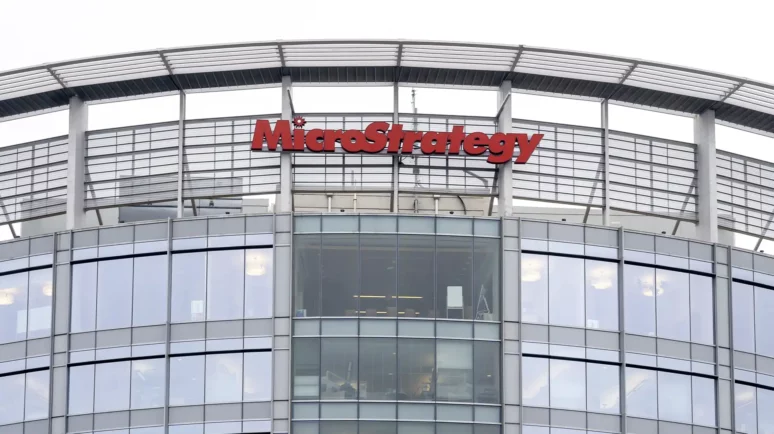Bitcoin Halving Sees Microstrategy Stock Jump, But ETF Competition Threatens MSTR

The Recent Bitcoin halving boosted MicroStrategy (MSTR) stock but the emergence of BTC ETFs might challenge its unique position in the market. l Source: Joe Raedle/Getty Images
Key Takeaways
- The optimism surrounding the recent Bitcoin halving translates to a surge in crypto-related stocks like MicroStrategy (MSTR).
- MicroStrategy’s CEO, Michael Saylor, has personally benefited from the stock and Bitcoin price increase.
- Recently approved Bitcoin ETFs have caused a temporary drop in MSTR shares.
- But, despite the ETF challenge, Saylor believes MicroStrategy remains attractive due to several factors.
In the wake of the recent Bitcoin halving, stocks like MicroStrategy (MSTR) are experiencing a surge, fueled by optimism surrounding the leading cryptocurrency’s future value. And its CEO, Michael Saylor, also benefitted from the king of crypto’s increase.
This rise also follows the approval of Bitcoin’s exchange-traded funds (ETFs), which have been previously seen – by the market, not by Saylor – as a threat to MicroStrategy’s performance.
MicroStrategy Stock Jumps Post-Halving
MicroStrategy (MSTR) and other US crypto-related stocks are seeing a notable uptick in trading activity. The recent completion of the Bitcoin halving contributes to this momentum, signaling a reduction in the future supply of Bitcoin. This fundamental shift is anticipated to bolster the coin’s price over the long term, benefiting companies closely tied to Bitcoin’s valuation.
While the short-term effects of previous Bitcoin halvings were less certain, the absence of significant market upheaval following the recent event has provided stability, allowing crypto stocks to thrive.
MicroStrategy, led by Bitcoin advocate Michael Saylor, saw an impressive surge of over 12% to $1,310 since the halving. The business intelligence firm currently holds 174,530 Bitcoin valued at $4.6 billion and plans further acquisitions.
MSTR wasn’t the only crypto-related stock that benefited from the BTC halving. Coinbase also experienced a notable uptick, with shares rising over 5% to $222 following the halving. Over the past year, Coinbase stock has surged by 300%, showing a 28% increase year-to.-date. With holdings of 9,181 Bitcoin valued at $207 million, Coinbase remains positioned for continued growth in the crypto market.
Saylor Gains $370 Million
MicroStrategy isn’t the only one celebrating gains following the Bitcoin halving. CEO Michael Saylor has reaped substantial rewards, netting $370 million from selling MicroStrategy shares this year alone. Last year, Saylor initiated a stock-sale agreement with the company, allowing him to divest his shares until April 2024.
Under this agreement, Saylor committed to selling up to 400,000 shares in the first four months of 2024. With 90% of the plan already executed, Saylor has realized significant profits, partly thanks to the rise in Bitcoin and MicroStrategy stock prices.
As of Friday, April 19, 2024, the combined value of Saylor’s MicroStrategy shares (excluding those included in the stock-sale plan) and his personal Bitcoin holdings amounted to approximately $3.49 billion.
MicroStrategy’s own Bitcoin reserves now stand at 214,246 BTC, representing 1% of the global Bitcoin supply following a recent acquisition of 9,245 BTC for $623 million. Saylor remains the company’s largest shareholder, with Class B holdings valued at approximately $2.3 billion. Additionally, his Class A holdings have reduced to 30,000 shares after the latest round of sales.
ETF Competition Impact On MSTR
A potential challenge facing MicroStrategy may have emerged from the recent approval of Bitcoin exchange-traded funds. The explosive debut of US spot Bitcoin ETFs has reshaped market dynamics, causing stocks such as Marathon Digital Holdings, Coinbase, and MicroStrategy to decline by at least 20% on some days following approval.
These stocks have historically closely mirrored Bitcoin’s performance, serving as a proxy for broader crypto sentiment. However, this proxy role has been significantly diminished with the introduction of spot Bitcoin ETFs. Investors seeking exposure to crypto sentiment can now do so directly through these ETFs rather than through related stocks.
Despite this shift, Michael Saylor maintained that the company will remain an attractive option for investors seeking Bitcoin exposure, even in the presence of approved ETFs.
Saylor emphasized MicroStrategy’s unique value proposition compared to ETFs. He highlighted that while ETFs charge fees and operate without leverage, MicroStrategy offers investors a fee-free, high-performance vehicle for Bitcoin investment.
Moreover, Saylor expressed confidence that Bitcoin ETFs will not only bolster Bitcoin’s attractiveness but also surpass gold ETFs in profitability. He described ETFs as a “universal API,” providing investors seamless access to various funds, including Bitcoin.
Private equity firm Kerrisdale Capital contended that the emergence of new spot BTC ETFs provides investors with alternative avenues for gaining exposure to Bitcoin, eroding any unique advantage MicroStrategy may have enjoyed through the premiums it charges. Previously, some investors favored purchasing MSTR as a means of indirectly accessing BTC.


